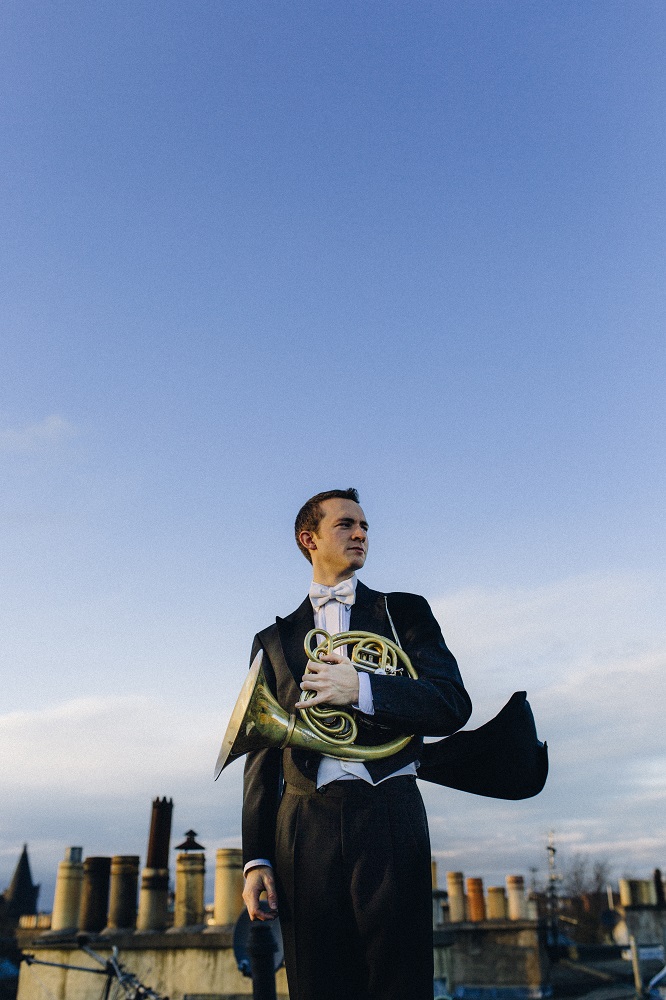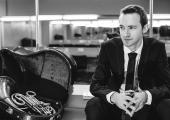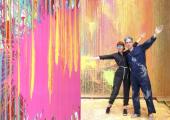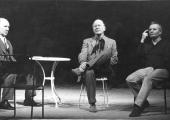Traditional musical formats rarely suit the individual talent, but the highly-motivated player always finds a way. I first got to talk to Alec Frank-Gemmill in the very sociable surroundings of the Pärnu Festival in Estonia, a gathering most musicians describe as the highlight of their year, with the phenomenal Estonian Festival Orchestra brought together by Paavo Järvi as its core. Frank-Gemmill's secure base is the Scottish Chamber Orchestra, another army of unusual generals. His solo engagements take him to extraordinary places, and thanks to the long-term support of the Borletti-Buitoni Trust, an organisation whose roster of young musicians reads like a musical who's who, he's just been able to record a horn and piano recital with a difference.
The subtitle of the disc, reviewed today on theartsdesk by fellow horn-player Graham Rickson, tells of its idiosyncrasy: "Music for horns and pianos of the 19th century". In other words two natural, two valve horns, and pianos by Lagrassa, Streicher, Blüthner and Bechstein. It's a captivating CD, unusually amenable for a recital to listening through at a single sitting; I've already played it four times. And it justifies the unique possibilities of the recorded format. Frank-Gemmill has also made individual commentaries on each of the pieces, which punctuate the interview. He told me about the motivation, and the larger question of orchestral versus solo work, on his lunch break from work as a professor at the Guildhall School of Music and Drama.
DAVID NICE A normal horn and piano disc could be monotonous, but your idea of varying the horns and varying the pianos too – that must have taken a lot of thought and work.
ALEC FRANK-GEMMILL Well, there's so many CDs out there. I could see the point – I'm interested in hearing other horn players and their interpretations, but there aren't that many differences between players of any instrument these days, and if you aim to do something different for the sake of it, that could be quite cheap. But to do this is actually providing some historical context, and was just a means for me to do something new. So it is hopefully in some way original and worth doing.
 I think actually – well, not in the case of all the pieces, not the later ones like [Glazunov's] Rêverie – with the other ones you could find on the internet each individual track [done authentically] and shove them together, however you wouldn't get the same person playing, so you wouldn't really be able to compare the sounds. Also my interpretations were based in part on what the horn wanted to do. That was part of the inspiration – I'm trying to make a distinction, not to do something definitive or claim it's the right way, but just for me to present it, so if this horn wants to play the piece like that and it's a horn I know the composer would have recognised, then that immediately inspires me to do something in a particular way, rather than – say, if I'd been born 30 years earlier, I might fall into the trap of saying, this is how it went then. And these 19th century horns are so different to each other – even a horn made in Paris in 1820 to the same design as one made in Berlin, that could change the sound utterly, so it's sort of a nod to authentic ideas. I'm not suggesting that this is the definitive recording, but I'm suggesting that it is something which could maybe enlighten us about how it might have sounded, so to that degree it is historical.
I think actually – well, not in the case of all the pieces, not the later ones like [Glazunov's] Rêverie – with the other ones you could find on the internet each individual track [done authentically] and shove them together, however you wouldn't get the same person playing, so you wouldn't really be able to compare the sounds. Also my interpretations were based in part on what the horn wanted to do. That was part of the inspiration – I'm trying to make a distinction, not to do something definitive or claim it's the right way, but just for me to present it, so if this horn wants to play the piece like that and it's a horn I know the composer would have recognised, then that immediately inspires me to do something in a particular way, rather than – say, if I'd been born 30 years earlier, I might fall into the trap of saying, this is how it went then. And these 19th century horns are so different to each other – even a horn made in Paris in 1820 to the same design as one made in Berlin, that could change the sound utterly, so it's sort of a nod to authentic ideas. I'm not suggesting that this is the definitive recording, but I'm suggesting that it is something which could maybe enlighten us about how it might have sounded, so to that degree it is historical.
...And how you can actually physically play, because if you've got weak and strong notes on the natural horn, it dictates the tempo...
Absolutely. For me, that was a joy. But I'm sure if I'd come to the disc as a different sort of player who already likes his particular tempos, it would have felt like a hindrance. So for me it was lovely, it gave the pieces some new reasons to be done. Especially on disc, because then you can sit down from beginning to end and hear the different sounds.
And it makes a fine programme, too.
Yes, it was nice because I could choose all the best pieces from the 19th century, rather than just thinking, oh, this has been done a million times. [Schumann's] Adagio and Allegro, someone has played it on a modern Vienna horn, and I think there's a recording somewhere on an old Vienna horn. They are very similar instruments, but rather like horns made now instead of in 1905, they are bigger and more orchestral and fatter and less intimate. That Beethoven Horn Sonata, quite a few people have recorded that now on natural horn.
Do they get the flourishes as well as you do at the end of the first movement, those fantastic arpeggios?
Well you know, that bit on natural horn just works – I didn't have to practice. That's lovely because it doesn't just feel like an easy piece with a couple of hard bars, it feels like a nice piece and you're just working on how to phrase it. [Below: the first of four films in which Frank-Gemmill introduces the different 19th century horns on the disc]
Do you have a particular favourite sound amongst all those?
I think it's totally subjective – it's clouded by what I found a struggle and what came easily. Probably my favourite thing is the Rossini [Prelude, Theme and Variations], because I never liked the piece before this disc, and I find it really attractive now played on the natural horn. But maybe with a bit more distance, the Rêverie sounds so right on that horn with an old fashioned, almost proto-Hollywoodesque sort of warmth but also a bit of clunkiness – ahh, it was so nice to play that piece like that!
The essence of the horn to me is the warm, rounded Brahms sound – how do you feel about that now?
I touch very briefly on that in the notes [in the CD booklet, excellent] when I talk about Franz Strauss, because we now have the view of what the horn is, and these pieces might give a slightly different perspective; but I agree, that's why we all took up the horn, and I think that's the universally appealing, romantic, deep sound, and Brahms understood that immediately. But what's interesting about Brahms is that he often preferred the natural horn because it got closer to that, and probably in the 19th century – I've only just thought of this since you said that – maybe the whole development was about finding the esence of what the horn is in the romantic era. And now you can buy horns that are much harder to miss notes on. I think I could play on those because I've got my own job and I could just decide what technology I wanted, but I wouldn't let any of my students play them. Because it's not what the horn is – some of the beauty of it is to do with the struggle. The natural horn is of course much harder than the modern horn, but then when you do manage, it's that much more beautiful as well. Actually, that's bad advice, better not think that [big laugh].
When you were studying, was there a particular sound you were aiming for, or you were told to aim for by your teacher?
I could be swayed a bit more easily at the time. And like a lot of people I took up the horn because of Dennis Brain, and that sound – you couldn't really be employed making the kind of sound he made. Well, you could as a soloist, I suppose, but you would be out on the lunatic fringe. Which might be quite nice. Then my problem, or my luck, is that I feel inspired by different orchestras and different players in different repertoire, so I don't have any idol for every single piece, and maybe half my problem but half my success has been searching to the n-th degree for a particular way of playing a particular composer with a particular sound.
But that's the ideal, isn't it, it's about the music and not about the player...
Exactly. But some of my teachers were astonishing. Anyway, I love listening to the Vienna Phil playing Mahler, I love listening to the LSO playing Mahler, then probably hearing the Scottish Chamber Orchestra in a Mozart symphony
There are lots of orchestras doing brilliant things all the time but I have my particular tastes. It's funny because sometimes orchestras ring you up and offer you work, or even offer you a concerto, and they don't say we'd like this concerto, or this patch of work is this composer, and you think, I don't know if I want to do this, because what if it's my least favourite Shostakovich symphony with nothing to do in it, or what if it's Mahler Nine, that seems crazy to me. At some point you've got to earn money, but I'd quite like to earn money and pick and choose my favourite music.
Next page: on future options, the music not the player, and more on the choices of horns and pianos



 I think actually
I think actually 






